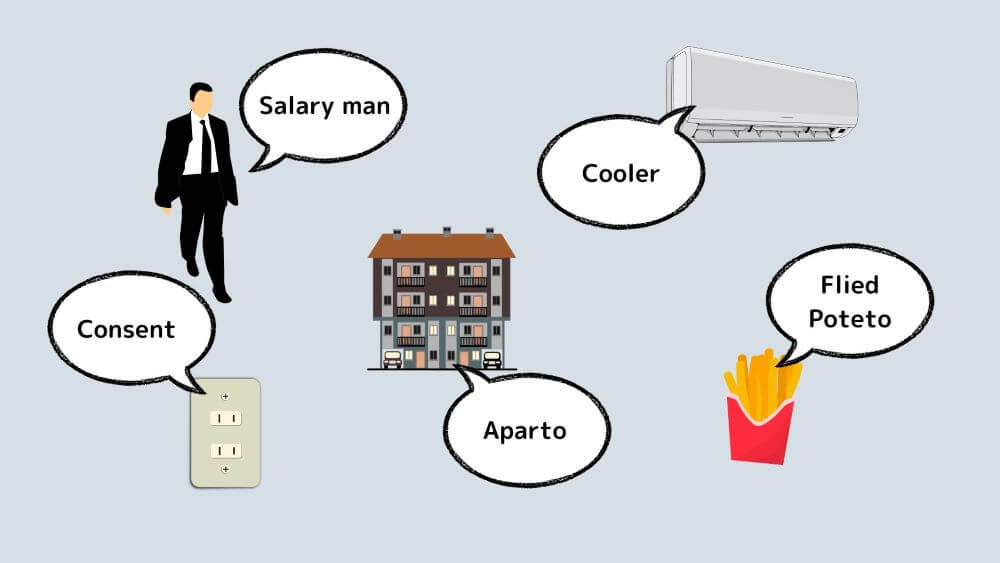Are you learning Japanese? If so, understanding “Japanglish” is inevitable. In this article, we introduce representative Japanglish words frequently used in everyday life.
What is Japanglish?
Have you heard of Japanglish? It refers to “Japanese words that sound like English” and is also called “Wasei-eigo“. Japanglish emerged as Japan rapidly adopted Western culture after World War II. During this period, English words were incorporated into Japanese and adapted to fit the language. There are many types of Japanglish, and they are commonly used in daily life in Japan. Unfortunately, many Japanese people believe these words are correct English, even though they often involve incorrect usage, abbreviations, or a blend of languages, which can confuse English speakers.
Understanding Japanglish is an essential step in comprehending conversations with native Japanese speakers. Moreover, these words offer insights into Japan’s cultural background and unique thinking. While Japanglish can be perplexing for English speakers, it also highlights an interesting aspect of Japan’s unique linguistic culture.
Common Japanglish Words
Here are some common Japanglish words along with their meanings in English:
Japanglish abbreviated English words
These are Japanglish words that use shortened forms of the original English, like “air-con” for “air-conditioning.” It’s not just about abbreviating words—other changes happen too, like pronouncing “v” as “b” since the “v” sound doesn’t exist in Japanese, or adding vowels to the end of words that would usually end in a consonant. Because of these changes, it can be hard for native English speakers to understand these Japanglish words if they don’t know them already.
| Japanese | Pronunciation | Meaning in English |
|---|---|---|
| コンビニ | conbini | Convenience store |
| アパート | aparto | Small apartment building |
| リモコン | rimokon | Remote control |
| ドライバー | draiber | Screwdriver |
| パソコン | pasokon | Personal computer |
| セレブ | celebu | Celebrity |
| ミス | misu | Mistake |
| エアコン | air con | Air conditioner |
| サンド | sand | Sandwich |
| テレビ | terebi | Television |
| カーナビ | car navi | Car navigation system |
Japanglish from English words with different meanings
This is a list of Japanglish words that use real English words with different meanings from the original. Because the original English words exist, these can easily cause misunderstandings.
| Japanese | Pronunciation | Meaning in English |
|---|---|---|
| マンション | mansion | Big apartment building |
| サイン | sign | Signature |
| クレーム | claim | Complaint |
| テンション | tension | Excitement or energy level |
| バイキング | viking | Buffet |
| ホーム | home | Train platform |
| マイカー | my car | Owned car |
| カンニング | cunning | Cheating exams |
| チャック | chuck | Zipper |
| ペンション | pension | Small guesthouse |
| ラフ | rough | Casual |
| ビニール | vinyl | Plastic bag |
| コンセント | consent | Electrical outlet / Socket |
Japanglish words uniquely created from English.
Below is a list of Japanese words that sound like English but are uniquely made by combining or / and shortening English terms. Even if English speakers can hear these words, they’ll likely find it hard to understand their meanings.
| ドンマイ | don’t mai | Don’t worry about it |
| サラリーマン | salary man | Businessman |
| ガソリンスタンド | gasoline stand | Petrol station |
| シャーペン | sharp pen | Petrol station |
| フライドポテト | flied potato | French fries |
| ノートパソコン | note pasokon | Laptop |
| ガッツポーズ | guts pose | Victory pose |
| ハイタッチ | high touch | High five |
| ベビーカー | baby car | Stroller |
| クーラー | cooler | Air conditioner |
| コストパフォーマンス | cost performance | Value for money |
| キーホルダー | key holder | Keychain |
| スキンシップ | skinship | Physical affection |
| サイドブレーキ | side brake | Handbrake |
| マイペース | my pace | own pace |
| ワンピース | one piece | Dress |
| オーダーメイド | order made | Custom-made |
Japanglish is an unavoidable step in learning Japanese. While it can be bewildering for English speakers at first, enjoy learning it as a unique part of Japan’s linguistic culture.


